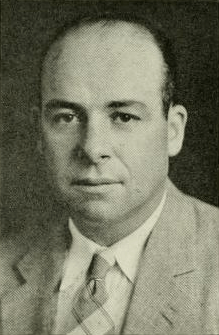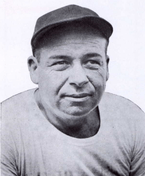Raymond Wolf
 Wolf pictured in Yackety Yack 1938, North Carolina yearbook | |
| Sport(s) | Football, baseball |
|---|---|
| Biographical details | |
| Born |
July 15, 1904 Chicago, Illinois |
| Died |
October 6, 1979 (aged 75) Fort Worth, Texas |
| Playing career | |
| Football | |
| 1924–1926 | TCU |
| Baseball | |
| 1925–1927 | TCU |
| 1927 | Columbus Senators |
| 1927 | Cincinnati Reds |
| 1928 | Columbus Senators |
| Position(s) |
Tackle (football) First baseman (baseball) |
| Coaching career (HC unless noted) | |
| Football | |
| 1929–1935 | TCU (line) |
| 1936–1941 | North Carolina |
| 1946–1949 | Florida |
| 1950–1951 | Tulane (line) |
| 1952–1953 | Tulane |
| Baseball | |
| 1935–1936 | TCU |
| Administrative career (AD unless noted) | |
| 1946–1949 | Florida |
| Head coaching record | |
| Overall |
57–54–6 (football) 17–21–1 (baseball) |
Raymond Bernard Wolf (July 15, 1904 – October 6, 1979), nicknamed "Bear" Wolf, was an American football and baseball player and coach. Wolf was a native of Illinois and an alumnus of Texas Christian University (TCU), where he played college football and college baseball. He played professional baseball for two seasons, and appeared in one Major League Baseball game for the Cincinnati Reds in 1927. Wolf served as the head football coach at the University of North Carolina (1936–1941), the University of Florida (1946–1949) and Tulane University (1952–1953), compiling a career college football coaching record of 57–54–6. He was also the head baseball coach at his alma mater, TCU, from 1935 to 1936 and the athletic director at Florida from 1946 to 1949.
Early years
Wolf was born in Chicago, Illinois in 1904. He attended Texas Christian University (TCU) in Fort Worth, Texas, where he played tackle for the Texas Christian Horned Frogs football team from 1924 to 1926.[1] He played professional baseball for the Cincinnati Reds organization for a single season in 1927,[2] but returned to TCU to graduate in 1928.[3] Thereafter, Wolf got his start in coaching, working with the TCU linemen from 1929 to 1935.[1]
Coaching career
From 1936 to 1941, Wolf was employed by the University of North Carolina in Chapel Hill, North Carolina to coach the North Carolina Tar Heels football team,[1] and compiled a 38–17–3 record in six seasons.[4] The university board of trustees renewed his contract at an increased salary in 1941 for an additional five years,[5] but his war-time service prevented him from coaching during World War II.
Wolf served as an officer in the U.S. Navy Reserve during World War II, and worked as a football coach at two of the service's naval aviation training stations, including the Navy's Pre-Flight School in Athens, Georgia and Flight Preparatory School in Austin, Texas.[6][7] He was eventually promoted to lieutenant commander, and after the war ended in September 1945, the Navy released Wolf to inactive duty.[8]

In 1946, Wolf was hired by the University of Florida in Gainesville, Florida to be the new head football coach of the Florida Gators football team, replacing coach Tom Lieb. Wolf coached the Gators for four seasons from 1946 to 1949 and posted a 13–24–2 record, but his Southeastern Conference (SEC) record was 2–17–2.[9][10] The Florida Board of Control balked at renewing his contract when his initial three-year term expired after the 1948 season, but offered him a two-year contract extension in the aftermath of widespread public demonstrations of support by the football team and the Florida student body.[11][12] Wolf was fired after the 1949 season, but nevertheless managed to leave Florida on a high note when his 1949 Gators upset the rival Georgia Bulldogs 28–7 for the first and only time during his tenure. In retrospect, Wolf's loyal Gators football players ironically dubbed his tenure as the "Golden Era," and many of his returning players formed the nucleus of Bob Woodruff's improving Gators football teams of the early 1950s.[13]
In 1950, Wolf was hired by head coach Henry Frnka of Tulane University in New Orleans, Louisiana, to be a senior assistant coach for the Tulane Green Wave football team. When Frnka unexpectedly resigned in March 1952, Wolf became the head coach and led the Green Wave during the 1952 and 1953 seasons,[1] finishing with a 6–13–1 overall record[4] and 3–12 in the SEC.[14]
Later years
After retiring from coaching after the 1953 season, Wolf became an administrative officer at TCU, his alma mater. He was honored as a member of the TCU Lettermen's Association Hall of Fame.[3] Wolf died of cancer in Fort Worth, Texas in 1979.[15]
Head coaching record
Football
| Year | Team | Overall | Conference | Standing | Bowl/playoffs | ||||
|---|---|---|---|---|---|---|---|---|---|
| North Carolina Tar Heels (Southern Conference) (1936–1941) | |||||||||
| 1936 | North Carolina | 8–2 | 5–1 | 2nd | |||||
| 1937 | North Carolina | 7–1–1 | 4–0–1 | 2nd | |||||
| 1938 | North Carolina | 6–2–1 | 4–1 | 4th | |||||
| 1939 | North Carolina | 8–1–1 | 5–1 | 3rd | |||||
| 1940 | North Carolina | 6–4 | 3–2 | T–5th | |||||
| 1941 | North Carolina | 3–7 | 2–4 | 11th | |||||
| North Carolina: | 38–17–3 | 23–9–1[16] | |||||||
| Florida Gators (Southeastern Conference) (1946–1949) | |||||||||
| 1946 | Florida | 0–9 | 0–5 | 12th | |||||
| 1947 | Florida | 4–5–1 | 0–3–1 | 12th | |||||
| 1948 | Florida | 5–5 | 1–5 | T–10th | |||||
| 1949 | Florida | 4–6–1 | 1–4–1 | T–10th | |||||
| Florida: | 13–24–2 | 2–17–2[9] | |||||||
| Tulane Green Wave (Southeastern Conference) (1952–1953) | |||||||||
| 1952 | Tulane | 5–5 | 3–5 | 8th | |||||
| 1953 | Tulane | 1–8–1 | 0–7 | 12th | |||||
| Tulane: | 6–13–1 | 3–12[14] | |||||||
| Total: | 57–54–6[4] | ||||||||
See also
- Florida Gators
- Florida Gators football, 1940–1949
- History of the University of Florida
- North Carolina Tar Heels
- Tulane Green Wave
- University Athletic Association
References
- 1 2 3 4 United Press, "Frnka Resigns as Tulane Coach; Wolf Appointed to Football Post," The New York Times (March 20, 1952). Retrieved April 29, 2010.
- ↑ MLB.com, Cincinnati Reds, Players, Ray Wolf. Retrieved April 29, 2010.
- 1 2 TCU Lettermen's Association, Hall of Fame, Alpha List of Hall of Fame Inductees. Retrieved April 29, 2010.
- 1 2 3 College Football Data Warehouse, All-Time Coaching Records, Raymond "Bear" Wolf Records by Year. Retrieved April 29, 2010.
- ↑ Associated Press, "N. Carolina Extends Contract," The New York Times, p. S19 (January 25, 1941). Retrieved June 29, 2010.
- ↑ Arthur Daley, "On College Gridirons," The New York Times (October 16, 1942). Retrieved June 29, 2010. Associated Press, "Lt. Wolf Transferred," The New York Times (January 14, 1943). Retrieved June 29, 2010.
- ↑ For a description of military-sponsored football teams during World War II, please see John Kieran, "Sports of the Times; Here's the Way They Go to School," The New York Times, p. S24 (August 27, 1942). Retrieved June 29, 2010. See also John Kieran, "Sports of the Times; Double Talk in Football Huddles," The New York Times, p. 28 (September 29, 1942). Retrieved June 29, 1942.
- ↑ Associated Press, "Bear Wolf Gets Naval Discharge," Miami Daily News, p. 7 (September 8, 1945). Retrieved May 14, 2010.
- 1 2 2012 Florida Football Media Guide, University Athletic Association, Gainesville, Florida, pp. 109, 115, 116 (2012). Retrieved September 16, 2012.
- ↑ Associated Press, "Wolf Resigns At Florida," The New York Times, p. S43 (December 6, 1949). Retrieved June 26, 1949.
- ↑ Associated Press, "Gators Give Bear Wolf A Watch," Daytona Beach Morning Journal, p. 6 (December 3, 1948). Retrieved January 18, 2011.
- ↑ Associated Press, "Florida Gives Wolf Another Two Seasons," The Evening Independent, p. 22 (December 6, 1948). Retrieved January 18, 2011.
- ↑ Tom McEwen, The Gators: A Story of Florida Football, The Strode Publishers, Huntsville, Alabama. pp. 149–151, 167 (1974).
- 1 2 Southeastern Conference, All-Time Football Standings 1950–1959. Retrieved March 16, 2010.
- ↑ ""Ex-Gators coach 'Bear' Wolf dies of cancer at 78", St. Petersburg Times, p. 4C (October 9, 1979); retrieved April 29, 2010.
- ↑ 2009 Southern Conference Football Media Guide, Year-by-Year Standings, pp. 74–77 (2009). Retrieved March 16, 2010.
Bibliography
- 2012 Florida Football Media Guide, University Athletic Association, Gainesville, Florida (2012).
- Carlson, Norm, University of Florida Football Vault: The History of the Florida Gators, Whitman Publishing, LLC, Atlanta, Georgia (2007). ISBN 0-7948-2298-3.
- Golenbock, Peter, Go Gators! An Oral History of Florida's Pursuit of Gridiron Glory, Legends Publishing, LLC, St. Petersburg, Florida (2002). ISBN 0-9650782-1-3.
- Hairston, Jack, Tales from the Gator Swamp: A Collection of the Greatest Gator Stories Ever Told, Sports Publishing, LLC, Champaign, Illinois (2002). ISBN 1-58261-514-4.
- McCarthy, Kevin M., Fightin' Gators: A History of University of Florida Football, Arcadia Publishing, Mount Pleasant, South Carolina (2000). ISBN 978-0-7385-0559-6.
- McEwen, Tom, The Gators: A Story of Florida Football, The Strode Publishers, Huntsville, Alabama (1974). ISBN 0-87397-025-X.
- Nash, Noel, ed., The Gainesville Sun Presents The Greatest Moments in Florida Gators Football, Sports Publishing, Inc., Champaign, Illinois (1998). ISBN 1-57167-196-X.
- Proctor, Samuel, & Wright Langley, Gator History: A Pictorial History of the University of Florida, South Star Publishing Company, Gainesville, Florida (1986). ISBN 0-938637-00-2.
External links
- Raymond Wolf at the College Football Data Warehouse
- Career statistics and player information from Baseball-Reference